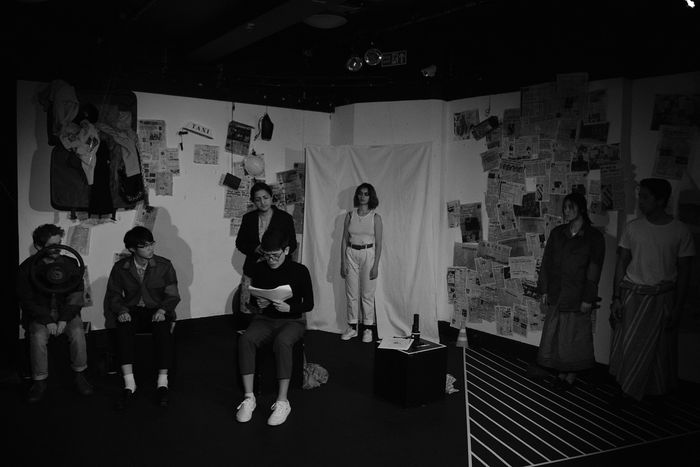Canon VS Contemporary? Thinking about the ‘old’ and ‘new’ in theatre
Helen Turner-Smyth argues that we don’t need to pick a side when it comes to classical and modern theatre
For a recent and (needless to specify) online supervision, our English class watched a 2018 recording of Nicholas Hytner’s Julius Caesar at the Bridge Theatre. It was an engaging and entertaining production that presented Shakespeare’s titular character as a kind of Donald Trump-esque leader. Whether the resonance between ancient and modern politics was imposed or merely foregrounded in Hytner’s creative interpretation is debatable, but it certainly does challenge the distinction between ‘old’ and ‘new’ in the context of drama.
It is tempting to assume (or, even, to employ pre-assumed) distinctions between the old and new when it comes to theatre. There is a shared common perception of ‘canonical’ or ‘classic’ works as opposed to plays and musicals that are making their debut; a contrast between what is being, merely, restaged or reinterpreted with works that are more recent or original. It is evident why audiences would distinguish between a piece of theatre that is, for instance, the first staging of a text, and latest performance in a long list of versions. However the ways in which old and new can complement and relate to one another should not be overlooked.
“The canonical and modern continue to inform, overlap, and invigorate each other”
It may not always be obvious but newly produced theatre is always indebted to the materials that have preceded it. Recently I learned how heavily the writers of Eastenders draw on plots from classical tragedy, a significant illustration of the old/new relationship (partly for how entertainingly it challenges the perception of soaps as ‘low-brow’ and) because it reveals how wide the cultural and temporal gap between what inspires and what it is inspired by can be.
Aside from the resonances of the old in the new, watching the same classics is (paradoxically) a invariably original experience. This can be true in the sense that things are often reinterpreted and restaged, evident both in the political allusions of Hytner’s Julius Caesar and Michael Buffong’s radio retelling of Oliver Twist as a story of modern refugee migration in Oliver: Lagos to London. However, it is also true that the audience is subject to change and in revisiting drama our reception to performances can be transformed; for instance watching The History Boys as a student rather than an applicant is a very different experience.
“Newly produced theatre is always indebted to the materials that have preceded it”
It can always be tempting to present elements of culture in opposition and ignore how they overlap or connect with one another. Earlier this year the Cambridge Union debated the proposition ‘This house prefers to read Oscar Wilde than George Orwell’. Those proposing the motion cited Wilde’s reputed epigrammatic wit. The opposition made successive speeches discussing the significance of Orwell’s work for the ways in which we think about liberty and state security. In fact, one of the most enlightening contributions to the discussion came from the floor when a member of the audience directed attention towards Wilde’s writing about Irish identity. It gave significant weight to those defending Wilde’s work from a new angle, one which considered the author in the more serious context of contemporary Anglo-Irish relations.* Defence of Orwell’s writing omitted even the mention of how enjoyable parts of his work are to read; whilst his portraits of life often document impoverished living in a strikingly visceral fashion, they also contain moments of observation that read satirically and can be very entertaining.
This is all a bit of a tangent but I hope it illustrates a tendency we occasionally indulge to draw sharp distinctions that can be of very limited use, such as the division between old and new theatre. The canonical and modern continue to inform, overlap, and invigorate each other; they are each present in creative production and performance, and always provide the opportunity for audiences to enjoy works that are, in some sense, original.
*I should credit the main speakers with possibly having exploited the effects of glibness - that is, highlighting the seriousness of a subject by knowingly and performatively skirting around it.
 Arts / Plays and playing truant: Stephen Fry’s Cambridge25 April 2025
Arts / Plays and playing truant: Stephen Fry’s Cambridge25 April 2025 News / Candidates clash over Chancellorship25 April 2025
News / Candidates clash over Chancellorship25 April 2025 Music / The pipes are calling: the life of a Cambridge Organ Scholar25 April 2025
Music / The pipes are calling: the life of a Cambridge Organ Scholar25 April 2025 Comment / Cambridge builds up the housing crisis25 April 2025
Comment / Cambridge builds up the housing crisis25 April 2025 News / Cambridge Union to host Charlie Kirk and Katie Price28 April 2025
News / Cambridge Union to host Charlie Kirk and Katie Price28 April 2025





